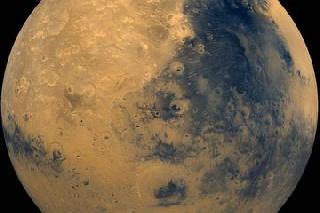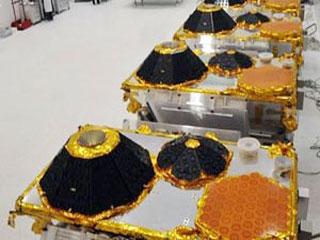
WASHINGTON (PTI): Man-made lifeforms are already in the works. Now, scientists have claimed these synthetic organisms engineered to use carbon dioxide as a raw material could help humans settle Mars one day.
Craig Venter, an American biologist who made headlines last year by creating the world's first synthetic organism, claimed that his team is now trying to design cells that can use atmospheric carbon dioxide to make food, fuel, plastics and other products.
This ability would obviously have huge implications here on Earth, but it could also help make Mars -- whose thin atmosphere is mostly carbon dioxide -- a more livable place, Venter said at an event organised by NASA recently.
"These kinds of processes will allow us to make almost anything needed there from that CO2 environment," Venter was quoted as saying by LiveScience.
In May 2010, Venter and his team announced that they had created the first living organism with a synthetic genome.
The biologists constructed the genome of the bacterium Mycoplasma mycoides from many preassembled units of DNA. Then they transplanted the genome into the cell of a closely related species that had been emptied of its own genome.
The "host" bacterium soon began to function and reproduce just as a naturally occurring M. mycoides would.
The feat was more than just a neat trick. It showed that custom-designing organisms to do all sorts of helpful tasks is eminently possible -- and may not be that far off.
Creating new lifeforms could help "solve some of the fundamental problems of providing sufficient energy, food, clean water and medicines," Venter said.
Venter, who also led a team that decoded the human genome a decade ago, said his top priority is using synthetic life to help solve these big problems on Earth.
Noting that the Earth is set to add its seven billionth person in just a few months, and population growth will not stop there, Venter said: "Obviously, food and fuel production are at the top of our list and society's list."
To that end, Venter's company, Synthetic Genomics, is trying to develop synthetic algae that produce biofuels cheaply and efficiently. Synthetic Genomics signed a USD 600 million deal with ExxonMobil in 2009 to help make this happen.
But the benefits of synthetic life don't have to be restricted to our home planet, Venter said. While artificially made CO2-munching organisms could help stem the tide of climate change here on Earth, on Mars they could provide the building blocks of a settlement, using raw materials pulled right out of the Red Planet's air.
"Use your imaginations to think of all the things, if you could design a cell, that we could make to change the future as we write this new software of life to create new sources of almost everything we need going forward," Venter said.
 Previous Article
Previous Article Next Article
Next Article









The Indian Air Force, in its flight trials evaluation report submitted before the Defence Ministry l..
view articleAn insight into the Medium Multi-Role Combat Aircraft competition...
view articleSky enthusiasts can now spot the International Space Station (ISS) commanded by Indian-American astr..
view article